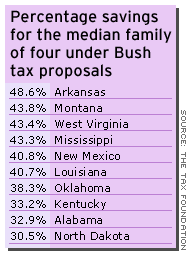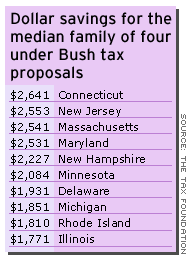NEW YORK (CNN/Money) – If President Bush gets his way, American taxpayers will be a little richer next year.
The GOP agenda got a shot in the arm last week with the resignation of Treasury Secretary Paul O'Neill, who some saw as a public relations liability, and White House economic advisor Larry Lindsey, marking the first major White House personnel shift. But the extent to which O'Neill's replacement, former CSX chief John Snow, will favor the Bush tax plan remains to be seen.
Whether such moves would stimulate the sluggish U.S. economy is also open to debate. But it's safe to assume such tax breaks, if passed, would help trim your 2003 total tax bill. Experts say many ideas being discussed on Capitol Hill – from picking up the pace on last year's tax cuts, to enacting full marriage penalty relief – would put hundreds, or even thousands, of dollars back in Americans' pockets.
“ We don't know exactly what the new provisions will be, but we're sure some of this is coming. ”
Bill Ahern
Tax Foundation
|
The Tax Foundation, a non-profit public policy research group in Washington, estimated just how much the median American family would save if four of Bush's main proposals passed: accelerating tax rate cuts (originally set to phase in through 2010), raising the child tax credit to $1,000 a child, eliminating the 'marriage penalty' tax, and letting the 10 percent bracket apply to more of their income.
"We don't know exactly what the new provisions will be, but we're sure some of this is coming," said Bill Ahern, communications director for the Tax Foundation.
Should all four tax cuts be adopted, the Tax Foundation said the median American family of four, earning an adjusted gross income (AGI) of $66,619, would save $1,133 on its 2003 tax bill. But the amount saved would vary widely between families in different states.
Who benefits most

On a percentage basis, residents of some states would profit more than others. Arkansas leads the pack. "The Natural State" would see a 48.6 percent reduction in a median family of four's tax bill, which would drop from $2,329 to $1,197. It's followed by Montana, which would see a 43.8 percent reduction, from $2,587 to $1,455, and West Virginia, with a 43.4 percent reduction in taxes from $2,608 to $1,475.
"States that have a low median income – that is, poor states – would see a much more significant percentage cut from their taxes," said the Tax Foundation's director of research and chief economist, John Barry.
But if you look at actual dollars saved, the winners are wealthier states. Connecticut families of four, for example, would enjoy tax savings of $2,641 as their average annual bill dropped to $8,330 from $10,971. In second place is New Jersey, where the same family would enjoy savings of $2,553, and third is Massachusetts, with tax savings of $2,541.
Click here to see how much you'd save in each of the 50 states.
Marriage penalty relief
Marriage penalty relief would mean two things. One is an increase in the size of the standard deduction for married couples filing jointly, currently $7,850, to exactly double that of a single filer, currently $4,700. The other is increasing the amount of income taxed at 15 percent for married couples to twice the amount of income taxed at 15 percent for single filers.
Full doubling would have been phased in by 2009, but Republican lawmakers have indicated they'd like to see it implemented immediately instead. Such a move would eliminate the marriage penalty only for those claiming the standard deduction, notes Setauket, N.Y.-based tax specialist Frank Degen.
According to the Tax Foundation, the median family of four would save $532 if the penalty were eliminated. But that figure varies by state. In Connecticut, median families of four earning $88,538 would save $1,541 if marriage relief took effect immediately. The same family in Wyoming, which earns $59,801, would save $533.
Accelerating rate reductions
The effect of accelerating rate reductions would vary greatly among families in different states, because only the top four tax brackets are scheduled to drop. The bottom two brackets – the 10 and 15 percent brackets – already are at their lowest levels.

If rate reductions were fully implemented in 2003, the top bracket, 38.6 percent, would drop to 35 percent. The 35, 30, and 27 percent rates each would drop by two points, to 33, 28 and 25 percent, respectively.
That means families with incomes large enough to fall into the top four tax brackets would see a reduction in their income taxes, but families taxed at the bottom two brackets would not. On a national basis, the median family of four would see no difference in their total tax liability of $5,170.
Such families in high income states, however, would enjoy a saving. In Massachusetts, for example, our hypothetical family earning $83,531 would see a drop of $319 in their tax bill.
Increasing the child tax credit
Credits are better than deductions because they reduce your overall tax liability dollar-for-dollar, so the parents in our hypothetical family of four receive a child tax credit for each of their two kids.
Currently, the child tax credit equals $600 for each child. The credit is scheduled to increase over time, reaching a maximum of $1,000 per child in 2010. But instating the full increase in 2003 would give parents $400 more per child, regardless of where they live.
Expansion of 10 percent bracket
Another proposal that might come to pass is widening the 10 percent income tax bracket. It currently applies to your first $12,000 of income, but Bush would like to see it apply to your first $14,000. The $2,000 difference currently is taxed at 15 percent. The change would let you pocket the 5 percent difference, or $100 (that's 5 percent of the $2,000).
Using our example, every median family of four would save the $100.

|

